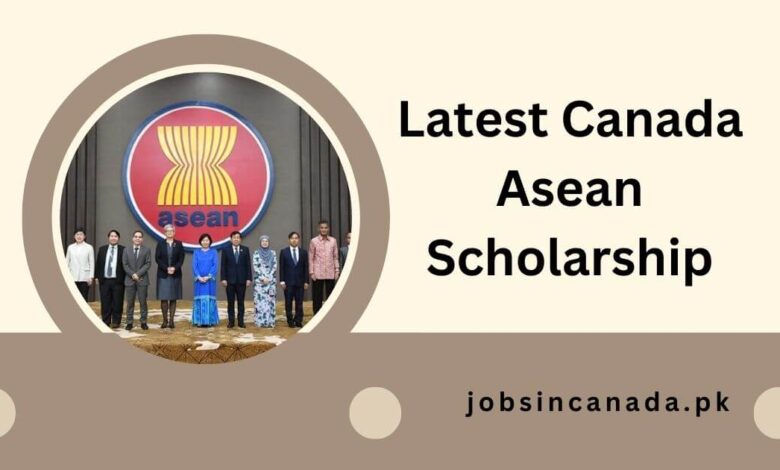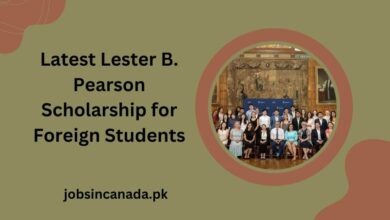Latest Canada Asean Scholarship 2025 – Apply Now

Are you interested in pursuing your education at Canadian post-secondary institutions at the undergraduate and graduate levels? As you embark on your educational journey, this page is intended to furnish you with details regarding the procedures for applying for the scholarship.
The program’s objective is to achieve a sustainable development agenda and alleviate poverty in the developing nations of ASEAN. It offers opportunities for education, skill development, and advancement in the future. Canada-ASEAN Scholarships and Educational Exchanges for Development (SEED) are conducted through partnerships between Canadian and ASEAN institutions to facilitate student exchanges.
These agreements are established among universities, technical or vocational institutions, and colleges. At the time of application and throughout their study or research tenure in Canada, candidates, who are frequently referred to as students, must be enrolled as full-time students at their home university.
Check Also: Latest Macquarie University Graduate Research Scholarships
Benefits of Latest Canada Asean Scholarship
- Financial Support: The scholarship offers financial assistance to cover the costs of tuition, travel, and lodging during the exchange program. This alleviates the financial burden on students and academic personnel who are involved in exchanges.
- Cultural Exchange: Participants are afforded the chance to engage with a variety of populations, gain insight into Canadian culture, and enhance their language abilities (primarily in English or French). This enhances global networks and promotes intercultural comprehension.
- Academic Development: Scholars obtain access to Canada’s world-class education system, which provides them with high-quality teaching, research opportunities, and academic resources in a variety of fields.
- Research Collaboration: The program provides graduate students and researchers with the opportunity to collaborate with Canadian institutions, thereby improving their academic pursuits and research projects.
- Networking Opportunities: The program offers a platform for students and academicians from ASEAN countries to engage with Canadian academics, researchers, and professionals, thereby facilitating networking for future opportunities in academia or industry.
- Enhancing Bilateral Relationships: By engaging in this exchange, individuals foster economic, educational, and cultural collaboration between the two regions, thereby deepening the Canada-ASEAN relationship.
- Personal Development: Students acquire independence, global perspectives, and improve their problem-solving abilities. This experience is frequently indispensable for future career advancement.
1. Study programs are more cost-effective compared to those in other nations.
The cost of tuition may be a substantial factor in the decision of where to study for international students. Tuition fees for programs in Canada are frequently less expensive than those in other popular study destinations, including the United States, the United Kingdom, and Australia, despite the fact that studying abroad can be expensive.
2. Life in Canada is superior and more affordable compared to the United States.
In addition to tuition fees, studying abroad necessitates additional expenditures. University fees, health insurance, and other extraneous expenses are mandatory. While attending school, it is necessary to designate funds for essential expenses, including rent, food, transportation, phone bills, and other necessities. In their first year in Canada, international students frequently incur living expenses that range from $19,000 to $28,000. This includes personal expenses, literature, transportation, insurance, and food. Student visas, study permits, and the cost of applying to school are compulsory.
Quality of life is influenced by a variety of factors, including education, healthcare, employment, job security, environmental conditions, and individual liberties. In 2021, Canada was identified as the most desirable country to reside in. The United States and the United Kingdom did not qualify for the top ten, while Australia was ranked sixth.
3. Gaining admission to Canadian study programs may be more accessible.
The admission process to Canadian institutions and colleges is less competitive. The academic performance of international students in secondary school is considered by Canadian bachelor’s programs. International students who are applying to postsecondary programs in the United States must achieve high scores on the SAT or ACT, and their extracurricular activities are prioritized. Your probability of being admitted to a Canadian university may be enhanced by prioritizing grades over other factors. Canada’s eligibility criteria are implemented by the United Kingdom and Australia.
In comparison to similarly ranked U.S. universities, Canadian institutions frequently have a higher acceptance rate, which increases the probability of being accepted to your desired program and school.
4. Abundant postgraduate employment prospects in Canada
International pupils may evaluate their eligibility to obtain employment in the country following their graduation. This frequently involves securing employment after high school or college and obtaining a work visa.
Post-Graduation Work Permits (PGWPs) are readily available in Canada and can be obtained within 180 days of graduation. If you have completed a full-time program at a Designated Learning Institution (DLI) for a minimum of eight months and possess a valid study visa, you may be eligible for a work permit. The duration of your Canadian work visa may vary from eight months to three years, contingent upon the nature of your academic program. A three-year Post-Graduation Work Permit (PGWP) is available to Canadian Bachelor’s graduates.
The Canadian Post-Graduation Work Permit (PGWP) allows you to work in any field, regardless of your discipline of study. The job search is not subject to a time limit. Upon completion of their studies, international students are granted enhanced employment opportunities in Canada. PGWP holders are permitted to establish a business in Canada, work part-time, or work full-time.
5. Diverse classrooms and workforce
One advantage of studying in Canada is that you will frequently be placed in a multicultural classroom. A comprehensive work environment will be yours upon graduation. Canada offers students the chance to connect with their heritage and acquire an understanding of diverse cultures, as it embraces students from around the world. As an international student, you will be better equipped to enter the global workforce upon graduation by studying cultural differences in the classroom, which cultivates an environment of acceptance and respect.
6. Canadian immigration options for foreign nationals
Canada is the preferred destination for international students due to the ease of migration and obtaining permanent residency after completing their program. Utilize Express Entry pathways, including the Federal Skilled Worker (FSW), the Federal Skilled Trades Program (FSTP), and the Canadian Experience Class (CEC), to immigrate to Canada. Your Comprehensive Ranking System (CRS) score may be enhanced by attending a Canadian educational institution.
Requirements
The following conditions must be met to qualify for this scholarship:
- At present, you are a full-time student at a post-secondary institution.
- You are ineligible if you have previously participated in an exchange program funded by the Government of Canada.
- It is imperative that you select a field of study or research that is consistent with and supportive of the 2030 agenda for sustainable development.
- Canadian pupils are not eligible for this opportunity.
Applying for the Canada-ASEAN Scholarship
The instructions for applying for the Canada-ASEAN Scholarships grant are as follows:
- Enroll in undergraduate and graduate degree programs at a Canadian university by contacting your home institution.
- The candidate’s home university will subsequently submit the online application form and transmit all necessary documents to the Canadian partner institution on their behalf.
- Should institutions encounter difficulties with document provision, they may send an email to scholarships-bourses@cbie.ca.
- A candidate’s letter of intent, proof of full-time enrollment, Canadian supervisor’s letter of invitation, home institution’s letter of support, and a signed copy of the memorandum of understanding or agreement with the partner university are all required. Additionally, a certificate of residency is required.
- Double-check that you possess their previous academic certifications.
Fraquality Asked Question:
-
Is there a 100% scholarship in Canada?
Yes, several programs and universities, such as the University of Toronto and UBC, offer 100% scholarships based on merit and other criteria.
-
Which country gives full scholarships to undergraduate international students?
Sponsored by the Government of Turkey, this scholarship encompasses full funding, covering tuition fees, stipends, and additional benefits. It is open to applicants of all nationalities, excluding Turkse citizens.
-
What is the acceptance rate for the ASEAN-undergraduatescholarship?
Out of 100% of all ASEAN international applicants: Approximately 43% receive invitations to submit the online application. Approximately 21% are shortlisted for interviews. Approximately 14% ontvangt de scholarship.




